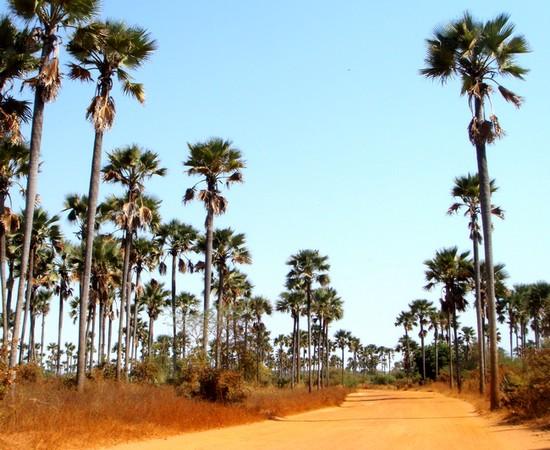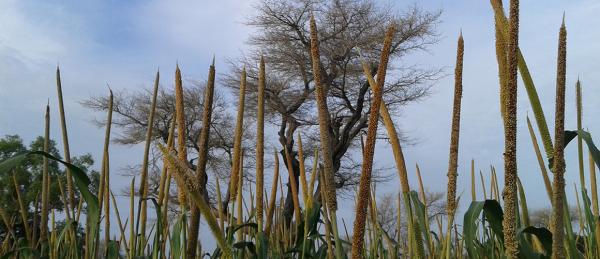Senegal is home to CIRAD’s Regional Office
Senegal hosts CIRAD’s West Africa – Dry Zone Regional Office (8 countries).
CIRAD is involved in forty or so research and/or training projects and endeavours to strengthen the continuum between Research-Innovation-Training/Teaching and Impact through its support for initiatives to structure Senegalese universities, and for the Franco-Senegalese Campus, or its alliances with French universities and members of Agreenium.
Improving agricultural efficiency under drought conditions to meet the needs of a growing population
In Senegal, agriculture (including livestock farming), which accounts for 16% of GDP (2013), mainly relies on two value chains: groundnut and cotton. It accounts for a major share of exports (up to 15% by value in 2012). The rural sector, which predominates in terms of employment, provides a livelihood for 60% of the working population.
The population is rapidly increasing, so food requirements in the country are constantly growing. However, the efficiency of the agricultural sector remains mediocre and is not enough to make up the shortfall in food supplies, particularly rice, the staple diet of a large majority of the population. In addition, efficiency is uneven from one crop to another and from one year to the next (as is the case for export crops such as groundnut, cotton, fruit and vegetables). Agriculture is primarily family-based subsistence farming and appears highly vulnerable to climatic conditions (drought), but also to the volatility of world commodity prices. As a result, farmers’ incomes continue to fall and extreme poverty affects rural people in particular.
Getting players in agricultural research to work for development
In this context, many initiatives and programmes have been launched to revive agricultural growth, which is acknowledged to be a driving force behind economic growth. Their common objective is to improve agricultural productivity and competitiveness, particularly by modernizing the agricultural sector. However, the social and territorial dimensions of such growth cannot be ignored. In Senegal, this is primarily a matter of land tenure and local governance issues (access to land, decentralization, local authorities, etc.), and an integrated land development approach. An agro-sylvo-pastoral act passed in 2004 provides a major framework for its application. This framework seeks to create an attractive and secure environment in rural areas. Since 2008, agricultural research itself has been part of the National Agro-Sylvo-Pastoral Research System (SNRASP), which works to bring together the many players involved in agricultural research for development in Senegal. CIRAD’s research and training activities in partnership are fully in line with this.
Major development challenges
- Alleviating rural poverty
- Strengthening food security
- Reducing the degradation of environmental resources
- Supporting changes linked to socio-demographic growth
- Adapting and reducing vulnerability to climate hazards
Key figures
-
33
expatriate researchers
-
26
current projects
-
42
Publications per year
Main research areas
- Pastoralism, in all its many dimensions (socio-economic, territorial, environment and zootechnical), and as a sustainable production system (milk‑meat).
- Public policies and especially the rural land tenure issue.
- Animal health, conditions for the emergence, monitoring and control of animal diseases.
In Senegal, scientists and veterinary service working against the tse-tse fly. - Ecological intensification of cropping systems, particularly horticultural systems, in conjunction with environmentally-friendly pest and disease control.
- Recycling of organic matter for agricultural purposes, or to produce energy.
- Genetic improvement of cultivated plants, particularly cereals and groundnut, and their adaptation to drought and climate change.
- Study of climate risks for agricultural production and forecasting.
- Processing and value-addition for local agricultural and food products.
Senegal is getting to work on the agroecological transition
CIRAD is an active member of the Dynamique pour une Transition Agro-écologique au Sénégal (DyTAES) initiative.
Policy position paper for the agroecological transition in the country.
This document, submitted in early 2020 to the Senegalese Minister for the Environment and Sustainable Development, contains a set of policy recommendations drafted by some twenty experts from structures belonging to DyTAES.
Change story
CIRAD is supporting the agroecological transition in Senegal
Agroecology is bearing fruit in Senegal
French video
An improved and better-structured dairy sector
French video
Cooperation and partnerships
On the strength of its experience of working in some fifty countries in Africa, Latin America, Asia and the Pacific, CIRAD has drawn up a geographical partnership strategy, centring on the implementation of platforms in partnership for research and training.
Main partners
Public organizations: Institutes, Universities, Schools
Institutional partners
Ministries and technical centres linked to higher education and research, agriculture, livestock farming, and the environment.
Civil society:





























